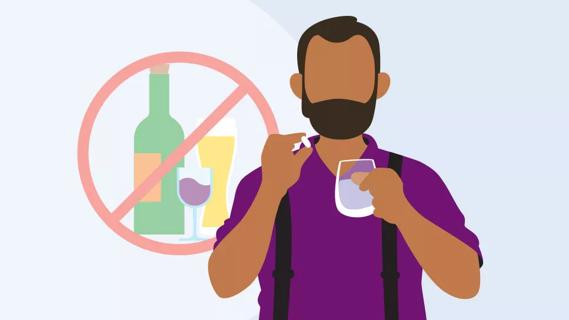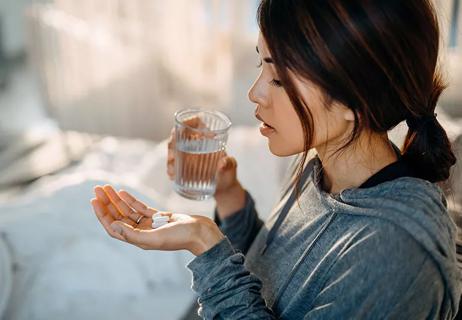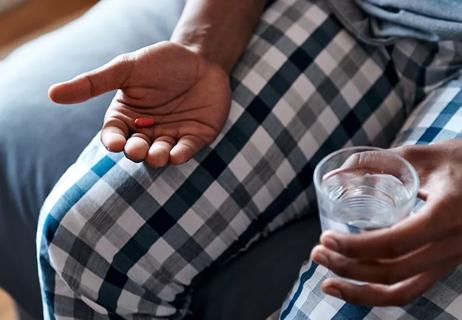Tips on probiotics and food choices

When you need to take antibiotics to treat a bacterial infection, the last thing you want to do is add more symptoms into the mix.
Advertisement
Cleveland Clinic is a non-profit academic medical center. Advertising on our site helps support our mission. We do not endorse non-Cleveland Clinic products or services. Policy
Yet many people suffer from an upset stomach when taking antibiotics. Diarrhea is a common concern. So are abdominal cramping and gas. In the worst cases, long-term antibiotic use can even lead to C. diff, a severe infection that causes colitis, or inflammation in your colon.
“The problem is that when you are trying to kill bacteria in your sinuses, lungs, or elsewhere, antibiotics also kill bacteria that live in your intestine that keep your digestive health in balance,” says family medicine physician Michael Rabovsky, MD.
These side effects are one of many reasons experts caution against overusing antibiotics. But when you truly do need to take them to fight an infection, you can also take steps to prevent or minimize diarrhea and other stomach problems.
It may seem strange: You’re taking antibiotics, so wouldn’t probiotics undo the good your treatment is doing?
However, probiotics add helpful bacteria to your digestive system — not the bacteria that cause infections. They don’t have any effect on the antibiotic treatment. They only treat the side effects.
“The thing that has really been shown to help the most with preventing diarrhea is taking probiotics when taking antibiotics,” Dr. Rabovsky says. He notes that reviews of studies suggest probiotics are effective both for regular antibiotic-associated diarrhea and for diarrhea related to C. diff. They also seem to help with side effects such as cramping and gas.
Advertisement
Probiotics come in several varieties. The most commonly studied for antibiotic-associated diarrhea are Lactobacillus rhamnosus-based and Saccharomyces boulardii-based probiotics. Probiotics come in capsules, tablets, powders and even liquid form.
With so many options, be sure to ask your doctor for advice before taking any probiotics, as you should for any type of supplement. Probiotics could possibly be harmful for people with immune deficiencies or those who are severely debilitated.
Would you prefer to get probiotics from food? Many types of yogurt contain probiotics. Look for “active and live cultures” on the label. Dr. Rabovsky often recommends one or two plain Greek yogurts per day for patients taking antibiotics.
However, if dairy gives you stomach problems, go easy on other dairy foods while taking antibiotics.
“People who tend to have more GI (gastrointestinal) symptoms do tend to get more GI side effects while taking antibiotics, at least anecdotally,” Dr. Rabovsky says. “It’s highly individualized.”
That means the foods that cause you stomach problems may be fine for someone else, so trust your gut. If spicy foods are normally a culprit for upset stomachs, avoid them when taking antibiotics. If sugar is your trigger, watch your sweet tooth. And although fiber is normally important for digestion, you may need to slow down your consumption if diarrhea flares up while you are taking antibiotics.
Check the label on your antibiotics. Does it recommend taking them with food or on an empty stomach?
In either case, follow the directions. Some antibiotics are better absorbed on an empty stomach, so you don’t want to limit their effectiveness. But if the label says, “Take with food,” taking your pills with a meal might help ease stomach issues.
Beyond the specifics above, good old-fashioned advice for treating diarrhea still applies. Drink plenty of water to avoid dehydration, and use rehydrating beverages high in electrolytes if needed. Avoid alcohol and caffeine if they’re making your diarrhea worse. Keep in mind alcohol may actually cause severe reactions while you are taking certain antibiotics, so check the label for that information, as well. Eat a more bland diet than you might normally eat.
It’s better to use caution than get hit with unpleasant side effects.
“Common sense would say you are going to disturb the natural balance with antibiotics,” Dr. Rabovsky says, “so anything else that causes you GI symptoms could make side effects even worse.”
Advertisement
Learn more about our editorial process.
Advertisement

This antibiotic can cause tooth staining that doesn’t fade on its own — but you still have options for whitening your smile

Even a little alcohol can slow your recovery, so it’s best to wait until after you finish your antibiotics before imbibing

How science is fighting superbugs

Don’t assume you need them when you’re sick

The caffeine and natural acids in coffee may trigger acid reflux, but there are ways to lessen the effects

They can feel similar, but the differences matter — especially if you’re at higher risk for complications

Understanding how your health information is recorded can help you take charge of your care

Yes, but symptoms can be easy to miss

Wearing a scarf, adjusting your outdoor activities and following your asthma treatment plan can help limit breathing problems

Your diet in the weeks, days and hours ahead of your race can power you to the finish line

When someone guilt trips you, they’re using emotionally manipulative behavior to try to get you to act a certain way